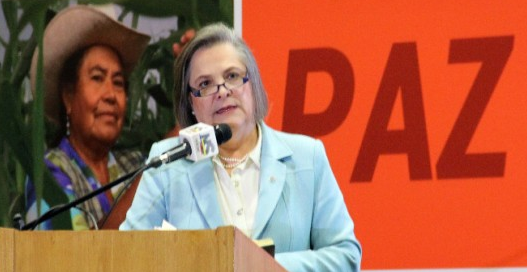Latin America Advisor
A Daily Publication of The Dialogue
How Much Will It Cost to Keep the Peace in Colombia?

Colombian Labor Minister Clara López, a former leader of the Alternative Democratic Pole party, said July 6 that the government continues to expect a “peace dividend” resulting in an increase in GDP by 1 to 2 percent following the anticipated signing of a historic peace agreement between the Revolutionary Armed Forces of Colombia, or FARC, guerrillas this year, though some critics have suggested this figure is unrealistic. Speaking in Washington at an Inter-American Dialogue event, López said “peace will pay for itself ... but that won’t happen immediately” and cited research suggesting that investments required to advance rural development programs could cost several percent of GDP. Where will a post-conflict Colombia acquire the funding for new programs needed in the short-term and long-term future, especially considering the drop in the global price of oil, which has been a key source of revenue? What steps is Colombia’s government taking to make the peace transition smoother and more likely to take hold? How will Colombia, which has long struggled with violence against organized unions and informality in the labor force, address issues related to labor in what is anticipated to be a profound period of change for the economy?
Enrique Gómez-Pinzón, partner at Holland & Knight: "It is expected that with the signature of the peace agreement with the FARC, new foreign investment will arrive to Colombia in different areas, especially in agroindustry, services, hospitality and tourism. In addition, there will be a significant amount of money that will no longer be spent on the war. Both aspects will generate new income for the government, which could be invested in the new programs needed in the short-term and long-term future. In addition, a complete tax reform is expected to promote investment, but at the same time generate revenue so that all taxpayers pay their contribution to finance the transition process. The government is betting on a new stronger economy boosted by the peace agreements. The Colombian government is working on publicizing the peace agreements through the media so that all citizens can understand what the government has negotiated with the FARC. At the end of the process, citizens will vote on confirming the peace agreement. Colombian businesses are committed to the process that the country will face and intend to hire demobilized guerrillas as part of the reconciliation process. In fact, although the government has not yet presented a bill to make this compulsory for companies, it is expected to happen in the short-term. Unions also are supporting the peace process."
Jorge Lara Urbaneja, partner at Arciniegas, Lara, Briceño & Plana in Bogotá: "It is hard to believe that the peace agreement with the FARC will magically increase Colombia’s GDP, despite the reality of the country’s economy. The economy will grow again if and when investor confidence returns. Employment comes with investment and entrepreneurial effort. That requires long-term commitments that can only be made in more stable circumstances. For that to happen, major changes must first occur in addition to the termination of violence which, for too many, may not necessarily result from a peace treaty. The Colombian economy is stagnant, with inflation rates fueled by devaluation and a lack of competitiveness. From the institutional side, the only clear future change is a rise in income tax, which experts consider the only cure for the high budget deficit generated by the peace process and all programs necessary for its implementation. But Colombia continues being a very difficult country in which to work and invest. Competitiveness in the international market is very hard, starting from the country’s monetary system, which imposes barriers and requirements that only exist in Colombia. Agriculture should also be better developed, but that is a very long-term proposition that, in addition to everything else, requires resources and infrastructure not seen in this country in ages. Besides, the FARC has plans for agriculture that may block institutional investors from entering this business. No major institutional changes have been announced. Unless peace comes with new opportunities, people will go back to what they were doing."
Beatrice Rangel, member of the Advisor board and director of AMLA Consulting in Miami Beach: "Spreadsheets created by public bureaucracies often fail to consider that development is not a linear process nor does human nature point straight forward toward progress. The peace bonus can only be attained if the former rebels cease all boycott operations against infrastructure and foreign investment while truly embracing democratic behavior. Also, the government must effectively supervise former combatants’ demobilization and integration into civic life, while also monitoring compliance with agreements, and, above all, winning the population’s trust and convincing them of the benefits of the peace process. From what appears in the Colombian media, one can safely assume that these elements are far from materializing. GDP growth will thus be modest, not surpassing 0.25 percent in the aftermath of the signing ceremony insofar as hostility toward FDI and infrastructure ceases to exist. I am not overly concerned about finding sources of funding. The Colombian economy is large enough and has enough geopolitical weight to be able to attract FDI in the form of public-private partnerships, which are about to become the premier infrastructure funding. As the Trans-Pacific Partnership progresses, the U.S. presidential campaign notwithstanding, Colombia’s and Mexico’s strategic weight will become a great magnet for public-private partnerships. In both cases, the degree of economic success will largely depend on government capacity to abide by the rule of law and extricate the scourge of delinquent violence from their respective societies."
The Latin America Advisor features Q&A from leaders in politics, economics, and finance every business day. It is available to members of the Dialogue's Corporate Program and others by subscription.



















